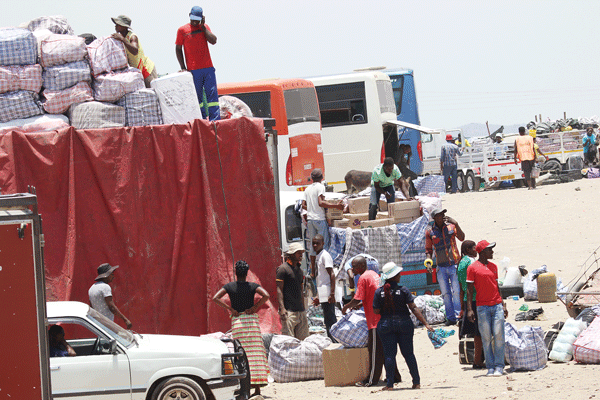
BY VANESSA GONYE
SOUTH Africa’s border town of Musina has witnessed a slump in business as the number of cross-border traders has dropped drastically due to economic problems of its northern neighbour.
Most retail businesses that relied on Zimbabwean clients have cut trading hours, with most closing around 2pm.
Since the turn of the century, Zimbabwe has turned to South Africa to acquire basic commodities as its own manufacturing industry collapsed due to hyperinflation, undercapitalisation and failure to replace ageing equipment.
A shop owner, at the China City Mall near the border with Zimbabwe, said their revenue has been affected by a low turnout forcing them to open only a few hours a day.
“I am way past my due date to pay my rentals and electricity, it has become difficult to raise enough in a month because customers are not coming like they used to,” a shop owner who requested anonymity, said. He added that they have had to bargain for the least possible price for any product to record sales and cover their bills as well as to remain in business.
Another shop owner said shoppers are declining by the day further worsening their plight.
“We have been badly affected by the deteriorating economic situation in Zimbabwe as it was our target market here. We used to record good sales here and we never had to scout for customers, but this time it has reached such low levels that we are struggling to keep our businesses going,” she said.
- Chamisa under fire over US$120K donation
- Mavhunga puts DeMbare into Chibuku quarterfinals
- Pension funds bet on Cabora Bassa oilfields
- Councils defy govt fire tender directive
Keep Reading
Cross-border buses are charging in United States dollars or rand, further worsening the predicament of the traders who usually get minimal profits after reselling their goods.
“We won’t gain anything if we charge in local currency which is losing value at an alarming rate,” a bus driver plying the route to Beitbridge said.
Taurai Morris, a driver with another local bus company, said the low turnout of customers has forced them to adjust fares in tandem with the prevailing situation to maintain profit margins.
“Fuel is our major worry; it is now difficult to procure enough fuel at once so we end up relying on the black market to fill our tanks for the long journeys. This means we have to constantly adjust our fares to realise something at the end of the day,” he said.
A cross-border trader said things had definitely gone south as traders have reduced their trips to the border town owing to the fluctuation in prices of goods which makes it difficult for them to realise profits.
Thousands used to cross the border into South Africa daily in January 2009 Musina had a shifting population of about 15 000 foreigners, overwhelmingly Zimbabweans, many of whom lived in a refugee camp at the showground or on the streets.











